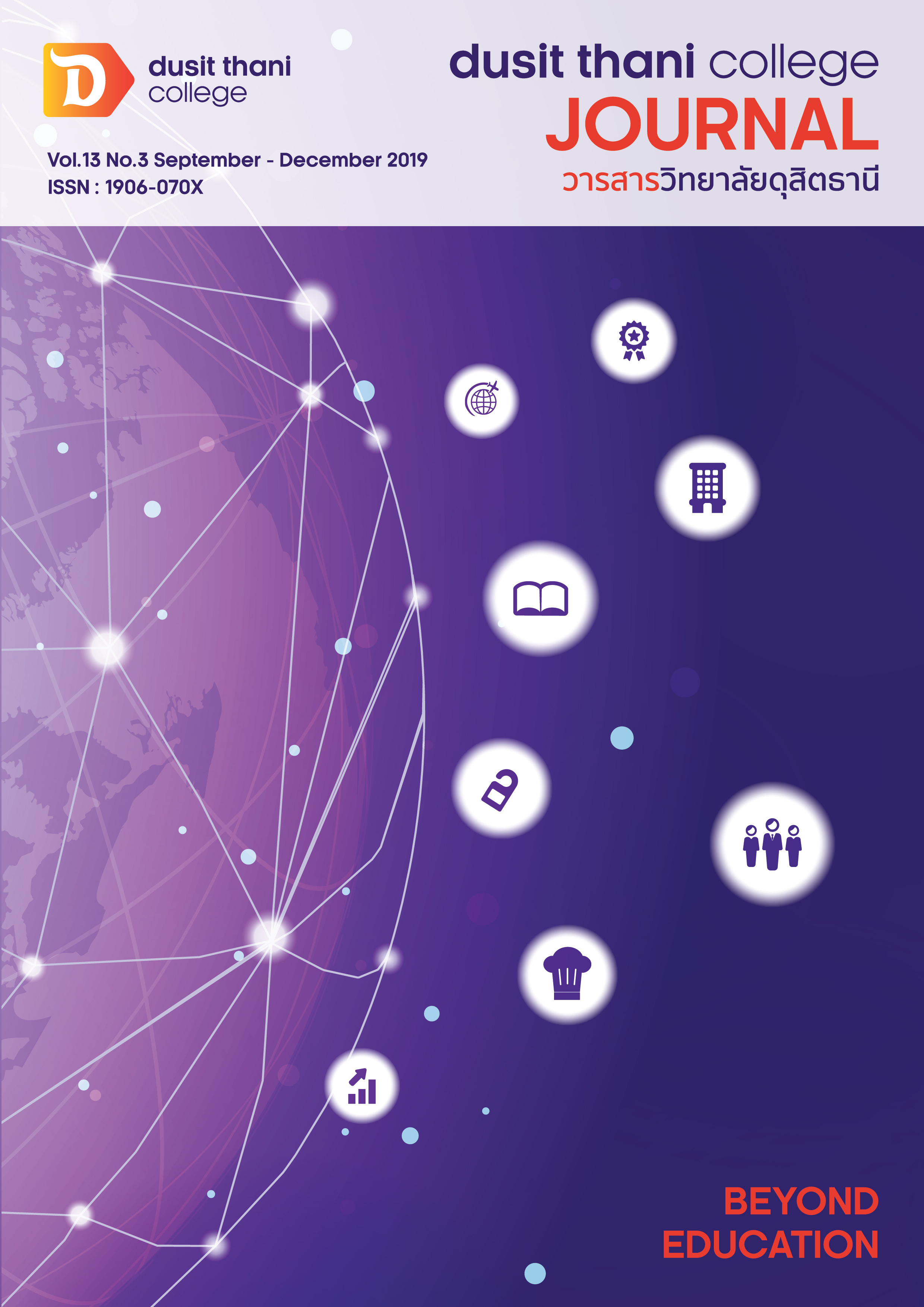The Food Waste Management Guidelines for Sustainability from Special Events in Hospitality Industry
Main Article Content
Abstract
The Objectives of this study were 1) to study the impact of food waste in Special Events in Hospitality Industry and 2) to create the food waste management guidelines in Special Events in Hospitality Industry. The summary is as follows:
- The impacts of food waste in Special Events in Hospitality Industry. There were 2 effects which were economic impact and environment impact. It was demonstrated that the unnecessary raw materials caused pollution to the environment.
The food waste management guidelines for Sustainability of Special Events in Hospitality Industry. It is an important role to reduce the amount of discarded food. With the 3Rs which are reduce, reuse and recycle. There were 5 management approaches which are; to store the necessary amount of raw materials, prepare a food plan to meet the needs, reduce the amount of food scraps from decorative inventions, check the raw materials quantity and raise awareness of service providers in reducing food output as a minimum, in order to create an important context for the special events for sustainability and stability
Article Details
Article Screening Policy
- All research and academic articles to be published must be considered and screened by three peer reviews in the relevant field / article.
- All articles, texts, illustrations and tables published in the journal are the personal opinions of the authors. Editors don't always have to agree. And no responsibility whatsoever is the sole responsibility of the author.
- The articles to be published must never be published. Where did you first publish? And not in the consideration of other journals If the audit found that there has been a duplicate publication It is the sole responsibility of the author.
- Any article that the reader sees as being plagiarized or impersonated without reference. Or mislead the work of the author Please let the journal editor know it will be your greatest blessing.
References
2. Chuerchan Natwadee, Laowansiri Sunanta, Thongma Veerapol. (2012). Impact of Advanture on Environment, Culture, Society and Economy: A Case Study of Maeram Sup-district, Maerim District, Chiangmai. Loei. Research and Development Journal, Loei Rajabhat University.
3. Events Industry Council (2018). Sustainable Event Professional Certificate Workbook. Events Industry Council
4. Horkunarak, Ampai (2017). Food Waste Crisis. Thailand Environment Institute. (Online). Source: http://www.tei.or.th/th/index.php. Retrieved on September 5, 2019.
5. Jaroenwongsak, Kriengsak (2017). Food Waste effect. (Online). Source: http://www.kriengsak.com/ foodwaste3. Retrieved on August 29, 2019.
6. Pollution Control Department. (2018). Pollution Situation Report 2018. Pollution Control Department.
7. P.Prayutto (2018). Sustainable Development. Nakornpratom. Wat Yanaves.
8. Office of the National Economic and Social Development Council. (2019, 8 September). The Eleventh Plan (2012-2016). Office of the National Economic and Social Development Council.
9. Silpasuwan, Piyachart (2014). Municipal Solid Waste: The Significant Problem of Thailand. The Secretariat of the Senate.
10. Srihapan, Salinla (2017). Food Waste Crisis. Thaipublica. (online). Source: https://thaipublica.org/2018/03/foodwastecrisis-tesco1. Retrieved on September 5, 2019.
11. Srijuntrapun, Patranit (2016). Intergrated Food Waste Reduction in Households. Bangkok. Silpakorn University
12. Sukhothai Thammathirat Open University (2014). Sustainable Development. (online).
Source: https://www.stou.ac.th/stouonline/lom/data/sec/Lom12/04-03.html.
Retrieved on September 7, 2019.
13. Tangjitwattana, Boonlert (2014). MICE Business. Bangkok. Fernkhaluang Printing.
14. Thailand Convention and Exhibition Bureau (2017). Introduction to MICE Industry. Bangkok. Thailand Convention and Exhibition Bureau.
15. T.Powers., C.W.Barrows (2001). Introduction to The Hospitality Industry. USA. John Wiley & Sons, Inc.
16. United Nations (2015). Sustainable Development Goals. United Nations.
17. United Nations Environment Programme (2019) Land is a Critical Resources: IPCC Report. (online). Source: https://www.ipcc.ch/2019/08/08/land-is-a-critical-resource_srccl. Retrieved on September 23, 2019.
18. Wetsanarat, Nubthong (2011). Introduction to the hospitality Industry. Bangkok.
Dusit Thani College.


